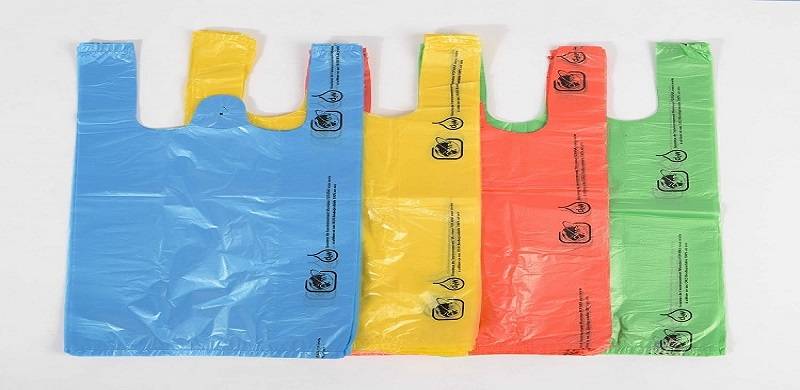
Amongst our enthusiastic chants of Saans Lenay Dou (let us breathe), a lot of us are unaware that the air pollution issue now stretches far beyond factors like smog and smoke. Unfortunately, there are still people trying to push the narrative that climate change is not real.
But if the fact that you’re inhaling plastic threw you into disbelief, you’d probably experience betrayal once you find out about the culprit that leads to this issue. Typically, we see air pollution as car exhaust pipes mercilessly coughing out smoke. However, when it comes to the issue of plastic particles in the air, the main root cause is oxo-biodegradable plastic.
Plastic pollution is an issue for which, considerable awareness has been raised even in Pakistan. A commonly suggested alternative to plastic bags is oxo-plastic bags. Oxo-plastic is a variation of plastic that is said to decompose naturally when discarded, alternatively also called bio-degradable plastics.
Undoubtedly there are sparse benefits of oxo-plastics as they lift the burden from the petrochemical industry, reducing the use of fossil fuels. However, biodegradable plastics, specifically oxo-biodegradable plastics have a rather misleading name, as they do not actually biodegrade.
When oxo-plastics seem like they’re biodegrading, they are actually breaking down into microplastics — microscopic pieces of plastic — that end up in waterways and the bodies of marine life and humans.
Microplastics are any pieces of plastic that are less than 5mm long. These also include washing products that contain micro-beads. They do not break down further and are consumed by humans and animals. Micro-plastics are now in the air and inhaling micro-plastic pieces is one of the many ways an average Pakistani gets plastic into their system. Upon entering the human body, plastic can lead to lung disease, auto-immune disease, liver inflammation, and gastrointestinal disorders among many other things.
The micro-plastic issue has made plastic so ubiquitous that it is now in the air we breathe. According to WebMD, a recent piece of analysis by scientists in the US suggests that average US citizens eat, drink and breathe 70,000 particles of these microplastics annually. There are no statistics worked out for this issue for Pakistan as of yet. While the United Nations called for an end to the use of oxo-plastic bags five years ago, they are still manufactured and used increasingly.
While individuals like you and I can, at most, make conscious choices by now switching to alternatives to oxo-plastics and to products containing micro-beads or any variations of micro-plastics, it is crucial to be informed about the magnitude of the situation of air pollution in Pakistan that we currently experience.
But if the fact that you’re inhaling plastic threw you into disbelief, you’d probably experience betrayal once you find out about the culprit that leads to this issue. Typically, we see air pollution as car exhaust pipes mercilessly coughing out smoke. However, when it comes to the issue of plastic particles in the air, the main root cause is oxo-biodegradable plastic.
Plastic pollution is an issue for which, considerable awareness has been raised even in Pakistan. A commonly suggested alternative to plastic bags is oxo-plastic bags. Oxo-plastic is a variation of plastic that is said to decompose naturally when discarded, alternatively also called bio-degradable plastics.
Undoubtedly there are sparse benefits of oxo-plastics as they lift the burden from the petrochemical industry, reducing the use of fossil fuels. However, biodegradable plastics, specifically oxo-biodegradable plastics have a rather misleading name, as they do not actually biodegrade.
When oxo-plastics seem like they’re biodegrading, they are actually breaking down into microplastics — microscopic pieces of plastic — that end up in waterways and the bodies of marine life and humans.
Microplastics are any pieces of plastic that are less than 5mm long. These also include washing products that contain micro-beads. They do not break down further and are consumed by humans and animals. Micro-plastics are now in the air and inhaling micro-plastic pieces is one of the many ways an average Pakistani gets plastic into their system. Upon entering the human body, plastic can lead to lung disease, auto-immune disease, liver inflammation, and gastrointestinal disorders among many other things.
The micro-plastic issue has made plastic so ubiquitous that it is now in the air we breathe. According to WebMD, a recent piece of analysis by scientists in the US suggests that average US citizens eat, drink and breathe 70,000 particles of these microplastics annually. There are no statistics worked out for this issue for Pakistan as of yet. While the United Nations called for an end to the use of oxo-plastic bags five years ago, they are still manufactured and used increasingly.
While individuals like you and I can, at most, make conscious choices by now switching to alternatives to oxo-plastics and to products containing micro-beads or any variations of micro-plastics, it is crucial to be informed about the magnitude of the situation of air pollution in Pakistan that we currently experience.
